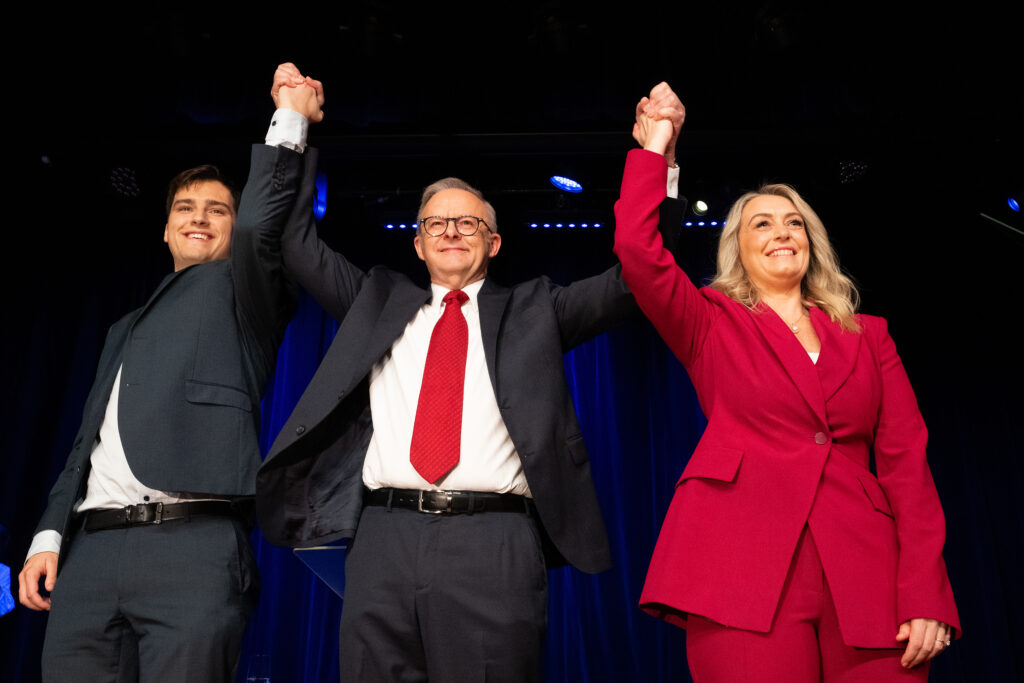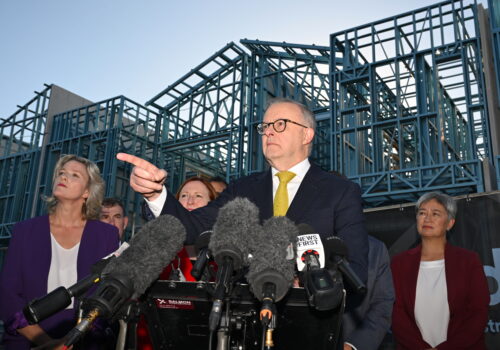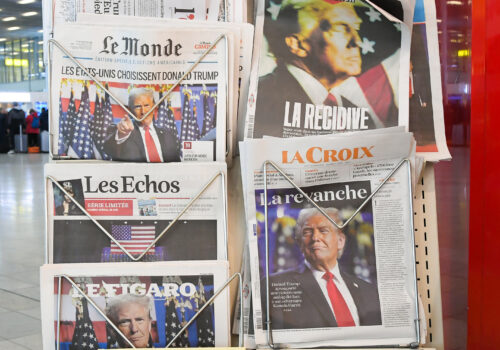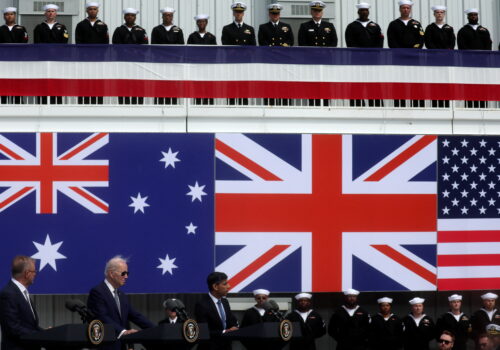CANBERRA—It’s been five months since US President Donald Trump was elected to a second term, but it felt at times as if he was a candidate in Australia’s election on May 3, as well. During the campaign, Trump cast a long shadow over both the progressive Labor Party Prime Minister Anthony Albanese and conservative Liberal-National Coalition Opposition leader Peter Dutton.
Labor’s resounding election victory is now being viewed as a mandate for the sensible center of Australian politics and a rejection of Trump-style politics in Australia. One Australian political commentator saw the results as rebuffing “bunyip Trumpism,” a reference to a mythical Aboriginal creature that inhabits waterholes, which is colloquially used to describe something that is seen as an imposter or pretender. But this election was a rejection of not just hard-right policies but also of the hard left. The Australian Greens Party ran a campaign on cost-of-living measures but also identity politics, Gaza, and anti-Israel sentiment. The party lost two of its previous four lower house seats, while Adam Bandt, the party leader, lost his seat. The party made no gains in the Senate, and its hopes of a “Greenslide” were demolished.
Labor now looks set to claim up to ninety of the 150 seats in the House of Representatives, as well as up to three additional senators. The conservative opposition looks set to be reduced to forty seats or less in the House.
But while Australian voters made clear their rejection of Trump, they still are remarkably pro-United States. The Albanese government will have to balance those two notions as it maps out its foreign policy in the months ahead.
How Labor won
Albanese is the first Australian prime minister to be re-elected since John Howard in 2004, and he is the first premier in one hundred years to increase their party’s majority after the first term. Albanese is now set to lead the largest Labor majority in history. The scale of Labor’s election win almost guarantees the party a third term in government in three years’ time. Meanwhile, the conservative coalition was defeated so soundly that even Dutton lost his parliamentary seat, leaving the conservative opposition leaderless and rudderless.
But this was not a pre-ordained outcome. From late 2024 through early this year, Dutton’s coalition was ahead in the opinion polls. Albanese and his government were seen to be struggling in the face of cost-of-living pressures and global uncertainty. Media outlets were calling the election a tight race, predicting a minority Labor government that would be dependent on a large cross bench of independents and Greens in the House of Representative and the Senate in order to govern.
But Dutton’s coalition made significant missteps in the five-week campaign, including several proposals reminiscent of Trump policies. Dutton failed to develop policies to win back seats lost at the last election to the center-right independents known as the Teals. He proposed unpopular policies on nuclear power, healthcare, and cost-of-living relief. Moreover, Dutton proposed massive cuts to public service jobs, which echoed the Trump administration’s Department of Government Efficiency (DOGE). A key moment for the campaign was when Jacinta Nampijinpa Price, a controversial conservative senator, vowed to “make Australia great again,” and accused the media of being “Trump-obsessed.”
These nods to Trump policies and slogans did the conservative coalition no favors. Since the beginning of Trump’s second term, Lowy Institute polling has recorded that Australians’ trust in the United States to act responsibly in the world fell by 20 percent, with only 36 percent of the public expressing any level of trust. Almost two thirds of the public (64 percent) say they hold “not very much” trust (32 percent) or no trust “at all” (32 percent) in the United States to act responsibly. Australians widely disapprove of several aspects of Trump’s policy agenda, including his proposal for a Ukraine peace deal that would cede territory to Russia (74 percent) and using tariffs to pressure other countries (81 percent). A majority of Australians also oppose the United States withdrawing from the World Health Organization (76 percent) and exiting from international climate change agreements (74 percent).
What will Labor do with this mandate?
The results leave the Labor Government with a strong mandate domestically and internationally. Albanese will likely continue with his steady, incremental reform agenda at home and abroad, focused on stability and pragmatism. Foreign policy was a carefully crafted balance among deepening the alliance with the United States; engaging in regional minilateralism, focused on Southeast Asia, Pacific Island nations, and India; and deepening security relations with Japan, both bilaterally and trilaterally with the United States.
Albanese’s brand of pragmatism will continue to drive how he engages with Trump and the United States. His government has refused to respond with reciprocal tariffs on the United States and has focused on dealing with the US president on the basis of Australia’s advantages in critical minerals, the US trade surplus with Australia, and a broader commitment to international free trade. Support for the Australia-UK-US (AUKUS) security partnership was bipartisan in the campaign. Defense spending is set to rise, even if modestly, and the alliance remains core to Australian strategy. One of the key features of Labor’s last terms in office were advances in US force posture in Australia and the alignment of strategic posture around denial and deterrence in the Indo-Pacific, which will continue to be a core focus over the next three years.
In addition, key areas such as shipbuilding, nuclear-powered submarine production, defense industrial collaboration, and the manufacture of guided weapons are priorities both of the Labor government and the Trump administration. This provides a strong foundation for defense cooperation. However, Australia and the United States diverge on key issues around international trade and the rules-based international order. This means there will be points of friction, and the Albanese government should be expected to carefully and tactfully point out policy differences on these issues.
Crucially, Australian dislike of the Trump administration should not be mistaken for antipathy toward the United States. The same Lowy Institute poll that showed a rejection of Trump’s policies shows that the Australian public is rock-solid in its support of the United States. Eighty percent of Australians continue to support the alliance with the United States (only a 3 percent drop from 2024) and they are evenly split on Trump’s demand that allies spend more on defense.
Labor will continue to focus on the Indo-Pacific, working closely with the United States and its regional allies and partners. It will keep dealing cautiously with, and balancing against, China and doubling down on ties with Southeast Asia, Pacific Island nations, Japan, India, and South Korea. With Albanese ascendant, expect more of the steady hand of Australia’s center-left government over the next three years rather than any policy radicalism.
Peter J. Dean is a nonresident senior fellow at the Atlantic Council’s Indo-Pacific Security Initiative, within the Scowcroft Center for Strategy and Security, and director of foreign policy and defense at the United States Studies Centre at the University of Sydney.
Further reading
Mon, May 5, 2025
How Trump’s tariffs could reshape Australia’s strategic outlook
New Atlanticist By John T. Watts
If US policies continue in the spirit of “running up the score” on allies, then Australia may look to expand its military relationships with other countries.
Fri, Nov 8, 2024
What the world thinks of Trump’s return to the US presidency
New Atlanticist By
From Ukraine to Australia, Sweden to Singapore, Atlantic Council experts examine how people in different countries view the decisive win by President-elect Donald Trump.
Sun, Sep 15, 2024
On the third AUKUS anniversary, a toast to ITAR reform and a call to keep going
New Atlanticist By R. Clarke Cooper
The landmark trilateral security partnership has come a long way, but current reform efforts will only reach their potential if additional regulatory adjustments are made.
Image: Australian Prime Minister Anthony Albanese, partner Jodie Haydon, son Nathan celebrate at the Labor Election Night function at Canterbury-Hurlstone Park RSL Club on Election Day of the 2025 federal election campaign, Sydney, Saturday, May 3, 2025. AAP Image/Lukas Coch.




